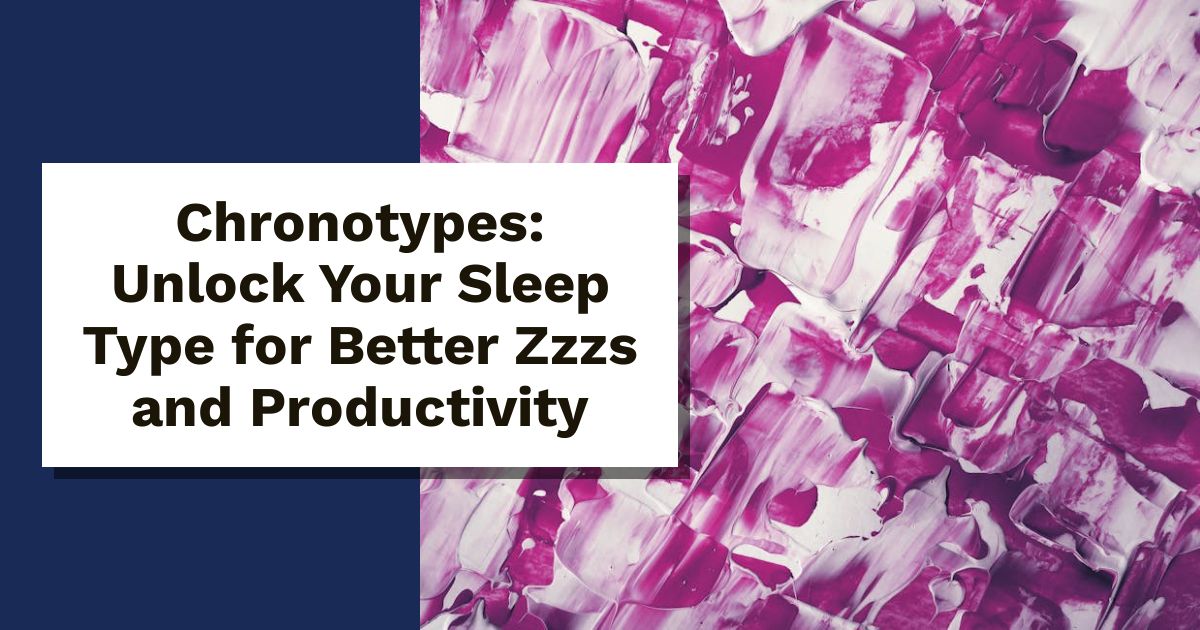Ever wonder why some people spring out of bed at dawn while others hit their stride at midnight? Welcome to the fascinating world of chronotypes, where your unique sleep pattern can transform your day-to-day life. Understanding your chronotype is like finding the secret sauce for better sleep and boost your productivity.
In this post, you’ll uncover what chronotypes are and how they influence your energy levels and focus. Whether you’re a night owl or an early bird, recognizing your natural rhythm can help you optimize your schedule. Ready to explore your sleep type? Let’s dive in and unlock the potential of your personal sleep cycle!
What Are Chronotypes?
Understanding chronotypes is key to unlocking better sleep and productivity. Your chronotype reflects your natural preference for sleep timing. Some of us thrive in the early morning, while others come alive at night. By recognizing these patterns, you can optimize your daily routine for enhanced energy and focus.
The Science Behind Sleep Cycles
At the heart of sleep patterns are circadian rhythms. These are natural, internal processes that follow a roughly 24-hour cycle. They regulate various bodily functions, including sleep-wake cycles, hormone release, and even body temperature. Circadian rhythms help signal when it’s time to sleep and when to wake up. Disruption to these rhythms, such as working night shifts or excessive screen time, can lead to problems like sleep disorders or fatigue.
For more in-depth information on circadian rhythms, check out these resources: Circadian Rhythm: What It Is, How It Works & What Affects It and Circadian Rhythms – Sleep Disorders.
Types of Chronotypes
Chronotypes can generally be categorized into a few main types:
- Morning Larks: These early risers feel most alert in the morning. They wake up with the sun and prefer to tackle challenging tasks early in the day. Their energy dips in the evening, making late-night activities less appealing.
- Night Owls: Night owls operate best during the evening and often struggle to get up early. Tasks that require focus and creativity might flow better for them late at night. This chronotype often feels tired in the morning and may need extra time to wake up.
- Intermediates (or Hummingbirds): These individuals fall somewhere in between larks and owls. They can adapt to early mornings and late nights but may not excel in either. Their flexibility allows them to adjust more readily to different schedules.
- Other Variants: Some research highlights additional types, like the “Finch,” who are most productive in the early afternoon. Each type has a unique rhythm, impacting sleep quality and daily performance.
To learn more about chronotypes and their implications, you can visit Chronotypes: Definition, Types, & Effect on Sleep and Are you a morning lark or night owl?. Understanding your chronotype can lead to improved sleep patterns and a more productive lifestyle.
Identifying Your Chronotype
Understanding your chronotype is crucial for optimizing your sleep and daily activities. By identifying your natural sleep type, you can tailor your routines to fit your unique energy patterns. Here are a few effective ways to uncover your specific chronotype.
Self-Assessment Quizzes
Self-assessment quizzes are a fun and interactive way to determine your chronotype. Several popular options can provide insights into your sleep preferences:
- Take the Original Chronotype Quiz: A quick evaluation to help you identify your sleep type and get personalized tips.
- Chronotype Quiz | What Is Your Inner Sleep Animal: Discover whether you’re a lion, bear, wolf, or dolphin and receive tailored sleep advice.
- Chronotype Quiz: Discover Your Sleep Animal: A short and free quiz that reveals your sleep patterns and offers optimization strategies.
- AutoMEQ – Your circadian rhythm type: A scientifically-backed test that helps pinpoint your natural sleep-wake patterns.
- Free Chronotype Quiz: An easy quiz that reveals your ideal sleep schedule and quick enhancements for better sleep.
Taking these quizzes can guide you toward understanding your natural rhythms better.
Observing Your Patterns
Beyond quizzes, observing your own sleep behaviors is essential. Track your sleep habits and energy levels to see what works best for you:
- Keep a Log: Note when you go to bed, how long it takes to fall asleep, and when you wake up. Look for patterns over time.
- Energy Peaks: Pay attention to when you feel most alert. Are you most productive early in the morning, or do you hit your stride later in the day?
- Daily Activities: Relate your energy levels to daily tasks. Do you find you can accomplish more challenging tasks at a specific time?
Using tools like best sleep trackers can help collect valuable insights about your sleep patterns and alertness throughout the day.
Journaling Sleep and Mood
Keeping a sleep journal can connect your sleep to your emotions and productivity. Track how your sleep quality affects your mood and output:
- Record Thoughts: Before bed, jot down how you feel and what you accomplished during the day. This can help recognize any triggers affecting your rest.
- Identify Trends: Look back at your entries to see how different factors impacted both your sleep and emotional well-being.
- Sleep Quality: Note if your emotional state or productivity levels correlate with how well you rested.
This practice can highlight potential areas for improvement. For tips on how journaling can enhance your sleep, check How Journaling Can Help You Sleep or explore the 4 Benefits of Journaling Before Bed.
By identifying your chronotype and making these connections, you can create a more productive and restful life!
Benefits of Knowing Your Chronotype
Understanding your chronotype can significantly enhance your daily life. By aligning your activities with your natural sleep patterns, you’ll notice improvements in productivity, sleep quality, and overall health.
Improved Productivity
When you recognize your energy peaks, you can plan tasks more effectively. If you’re a morning person, tackle challenging projects early in the day when your mind is sharp. Night owls, on the other hand, should schedule creative work for the evening when they feel most alert. This strategy doesn’t just make you more efficient; it taps into your body’s natural rhythm.
- Peak Performance: Maximize your output by working with your chronotype. Tasks done during your high-energy periods yield better results.
- Reduced Stress: By aligning tasks with your energy levels, you can minimize the stress of forcing yourself to work against your body’s natural tendencies.
Learn how knowing your chronotype can enhance your productivity here.
Better Sleep Quality
Respecting your chronotype can greatly improve your sleep quality. When you go to bed and wake up according to your natural rhythms, you sleep more soundly.
- Consistency: Sticking to a sleep schedule that aligns with your chronotype helps regulate your body’s internal clock. This leads to deeper and more restorative sleep.
- Fewer Disruptions: When you sleep at the right times, you’re less likely to experience interruptions, allowing for a more restful night.
Discover more about enhancing sleep quality through your chronotype here.
Health Benefits
Sleep consistency linked to your chronotype may lead to various health benefits. Regular sleep enhances recovery and promotes better metabolic health.
- Heart Health: Studies show that consistent sleep patterns can reduce the risk of heart disease by up to 57% (source: Psychiatrist.com).
- Mental Well-being: Regular sleep is tied to improved mood and reduced anxiety. Aligning with your natural rhythm keeps stress in check.
- Improved Immunity: Quality sleep strengthens your immune system, helping your body fight off illness more effectively.
For insights into the health advantages of sleep consistency, check out this article: Why You Should Keep a Consistent Bedtime Every Night.
By understanding and embracing your chronotype, you can unlock a healthier, more productive life.
How to Work With Your Chronotype
Understanding how to work with your chronotype can elevate your productivity and enhance your sleep quality. Here are three essential areas to focus on for getting in sync with your natural rhythms.
Adjusting Your Schedule
Timing is everything when it comes to maximizing your productivity based on your chronotype. Here’s how to align your tasks with your natural energy peaks:
- Morning Larks: Schedule demanding tasks for early in the day when your focus is sharp. Use afternoons for lighter activities.
- Night Owls: Take advantage of your evening energy. Plan creative projects or challenging work later in the day when you feel most alert.
Consider these resources to tailor your schedule effectively:
- How to Adjust Your Routine to Fit Your Sleep Chronotype
- Find Your Chronotype and Schedule Your Productivity
Creating a Sleep-Friendly Environment
Your sleep space influences how well you rest. A few simple tweaks can create an ideal sleep environment:
- Darkness: Use blackout curtains to block light. Darkness signals to your body that it’s time to rest.
- Temperature: Keep your room cool, ideally between 60-67°F (15-19°C). This range promotes deeper sleep.
- Noise Control: Use white noise machines to drown out disruptive sounds. Consider earplugs for a quieter night.
- Declutter: A tidy space can clear your mind and enhance relaxation.
Explore more tips for a better sleep space:
Mindfulness and Relaxation Techniques
Incorporating mindfulness into your nightly routine can improve sleep hygiene. Here are some effective techniques:
- Mindfulness Meditation: Focus on your breath, letting worries drift away. This practice calms the mind and promotes relaxation.
- Progressive Muscle Relaxation: Tense and release each muscle group. This technique helps release physical tension.
- Visualization: Imagine a peaceful scene as you fall asleep. It can distract from racing thoughts.
For more mindfulness strategies, check out:
Working with your chronotype can make a notable difference in your life. Make these adjustments, and you’ll find more satisfying sleep and increased productivity throughout your days!
Biohacking Sleep According to Your Chronotype
Understanding how to biohack your sleep involves recognizing not just your chronotype but also the tools and supports that can enhance your nightly rest. Here’s how you can optimize your sleep experience with supplements and technology tailored to your sleep type.
Supplements for Sleep Optimization
When it comes to improving sleep quality, certain supplements can be particularly effective. Here’s a list of popular sleep aids that may support better rest:
- Melatonin: This hormone is key in regulating your sleep-wake cycle. It’s especially helpful for night owls who need help falling asleep earlier.
- Magnesium: Known to relax muscles and calm the mind, magnesium can enhance the quality of sleep.
- Valerian Root: Often used as a natural remedy for insomnia, valerian root may help reduce the time it takes to fall asleep.
- L-Theanine: This amino acid, found in green tea, promotes relaxation without sedation. It’s great for night owls looking for a calmer bedtime routine.
- Glycine: This amino acid can lower body temperature, leading to improved sleep quality.
- CBD: Cannabidiol may help ease anxiety and improve sleep patterns for those who struggle with racing thoughts at night.
For more detailed insights on sleep supplements, check out Natural Sleep Aids: Which Are the Most Effective? and Supplementing Your Sleep – Harvard Health.
Technology and Sleep Aids
In today’s world, technology offers a plethora of gadgets and apps designed to improve sleep quality. Here’s a roundup of tools you might find beneficial:
- Sleep Trackers: Devices like smartwatches and dedicated sleep trackers monitor your sleep patterns. They provide insights into your sleep cycle, helping you understand your chronotype better.
- White Noise Machines: These devices drown out disruptive sounds and can help create a serene sleep environment.
- Sleep Apps: Apps like Calm and Sleep Cycle use soothing sounds and sleep analysis to help you fall asleep faster. They’re particularly useful for early birds who may need a little extra help winding down.
- Smart Pillows: These pillows often incorporate sound and vibration features to promote relaxation and better sleep.
- Wearable Tech: If you’re tech-savvy, consider wearables that provide tailored feedback on your sleep patterns and suggest adjustments based on your chronotype.
For a deeper dive into sleep technology, explore The Best Sleep Gadgets and Apps and Technology in the Bedroom.
Using the right supplements and technology can significantly impact your sleep quality and, ultimately, your productivity. Whether you’re a morning lark or a night owl, there’s a range of options to tailor your bedtime routine.
Chronotype Changes Over Time
As we journey through life, our sleep patterns can shift significantly. These changes are intriguing and can affect one’s productivity and overall well-being. Let’s explore how our chronotypes evolve from adolescence to adulthood and how our lifestyle choices can impact our sleep.
Adolescence to Adulthood
Many people notice that their sleep habits change as they transition from adolescence to adulthood. During teenage years, a tendency towards eveningness often emerges due to hormonal changes and social influences. This can lead to later bedtimes and difficulties with early morning commitments.
- Variation by Age: Research shows that adolescents often experience a natural delay in their sleep schedule, becoming more nocturnal. Consequently, early school start times can clash with their biological clocks. This shift typically stabilizes in early adulthood, where many may revert to earlier sleep patterns.
- Long-Term Trends: According to studies, as individuals age, they may become more inclined to rise early, resembling the morning larks of youth. This transition can be attributed to changes in circadian rhythms and lifestyle adjustments. For a deeper understanding of these changes, check out From Lark to Owl: Developmental Changes in Morningness and Change in Individual Chronotype Over a Lifetime.
Impact of Lifestyle Changes
Our lifestyle choices have a significant impact on our chronotype and sleep quality. Factors such as work schedules, diet, and stress levels can influence not just when we sleep, but how well we sleep.
- Work Schedules: Shift work and irregular hours can disrupt natural sleep rhythms. Adapting to a night shift often leads to a misalignment of one’s chronotype, causing fatigue and reduced productivity.
- Diet: What we eat plays a key role in our sleep patterns. Diets high in sugar or saturated fats can affect restorative sleep. Incorporating a balanced diet with fiber-rich foods can promote better sleep. Learn more about this connection in Nutrition and Sleep: Diet’s Effect on Sleep.
- Stress Levels: High stress can wreak havoc on sleep quality. Implementing relaxation techniques and mindfulness can counteract these effects, leading to more restful nights.
For additional insights on healthy lifestyle habits that can improve sleep, check out Sleep Better With Healthy Lifestyle Habits and The Connection Between Diet, Exercise, and Sleep.
Recognizing these changes over time and adjusting our lifestyles accordingly can lead to improved sleep quality, greater productivity, and a healthier life balance.
Conclusion
Aligning your lifestyle with your chronotype can be a game-changer for your sleep and productivity. Recognizing your natural sleep type allows you to tailor your daily activities and improve your overall well-being.
Take the time to experiment with your schedule and create a sleep-friendly environment. Consider tracking your patterns and trying out techniques that enhance relaxation.
Curious about your own sleep type? Jump into self-assessment quizzes and let your chronotype guide your journey to better sleep. Embrace the possibilities that come with understanding your sleep patterns, and watch as your energy and focus soar!
Brooke is a rock-climbing 🧗♀️, tennis-playing 🎾, biohacking 🧬 bookworm 📚 on a mission to unlock the secrets of health, longevity, and living life to the fullest 🌟. When she’s not scaling cliffs, hitting the courts, or testing out the latest hacks, you’ll find her nose in a book or adventuring with her four-legged best friend 🐕 by her side. With a knack for turning science into simple, actionable tips, Brooke’s writing is your guide to hacking your biology and living your best, most vibrant life!


